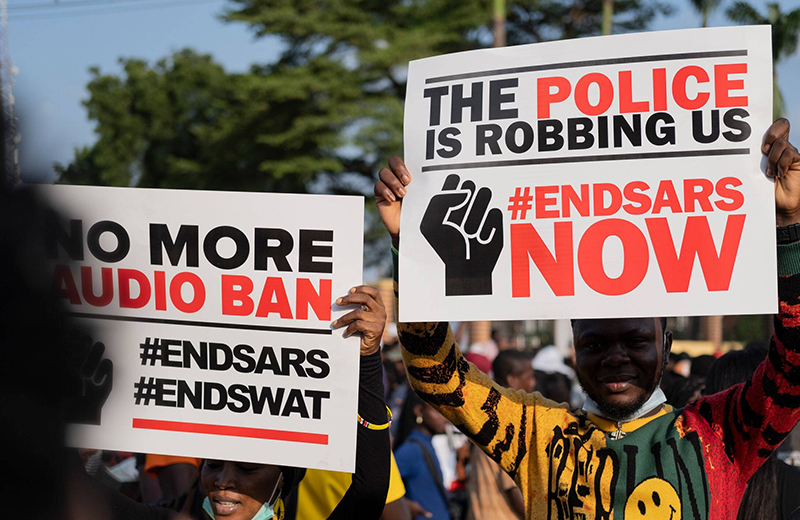Three years after, arrested #EndSARS protesters still languishing in Lagos prison — Amnesty International
Three years after the violent suppression of the nationwide #EndSARS protests against police brutality, a significant number of protesters who were arrested in 2020 remain in arbitrary detention, with the majority of them still awaiting trial. They are being held in Kirikiri Medium Correctional Centre and Ikoyi Medium Security Correctional Centre in Lagos.
The Nigerian authorities have levied unfounded charges, such as theft, arson, possession of unlawful firearms, and murder, against many of these protesters. Some of those in detention have alleged that they were subjected to acts of torture.
Isa Sanusi, the Director of Amnesty International Nigeria, expressed concern, saying, “Our investigation reveals a disturbing disregard for human rights by the Nigerian authorities. Three years in detention without trial is a grave miscarriage of justice, highlighting the authorities’ contempt for due legal process. The protesters must be released immediately and unconditionally.”
Torture in detention:
Among those detained, seven #EndSARS protesters, including Daniel Joy-Igbo, Sodiq Adigun, Sunday Okoro, Olumide Fatai, Oluwole Isa, Shehu Anas, and Akiniran Oyetakin, were arrested in Lagos in 2020 and are currently being arbitrarily held in Kirikiri Medium Correctional Centre.
Daniel Joy-Igbo, a Beninois #EndSARS protester arrested in Lagos in October 2020, shared his ordeal, stating, “Since my arraignment in December 2020, I have been incarcerated in prison without trial. There has been no adjourned date for my case, and I have not been taken to court since December 2020.”
Sodiq Adigun, also arrested in October 2020, who was previously detained at the State Criminal Investigation Department in Panti, voiced his plea, “Let the government release me. I have been detained since 2020 without trial. I am innocent. My life has been shattered. I need my liberty.”
In addition, eight #EndSARS protesters, including Segun Adeniyi, Onuorah Odih, Jeremiah Lucky, Gideon Ikwujomah, Irinyemi Olorunwanbe, Quadri Azeez, Olamide Lekan, and Sadiq Riliwan, have been detained without trial in Ikoyi Medium Security Correctional Centre in Lagos since 2020.
Isa Sanusi emphasized the need for their immediate and unconditional release, stating, “All those detained solely for participating in peaceful #EndSARS protests must be released without delay.”
The plight of detained protesters also involves reports of torture and other forms of ill-treatment while in detention since 2020. Oluwole Isa, who is currently held in Kirikiri Medium Correctional Centre, recounted how he was subjected to torture while in detention at the SARS facility in Ikeja, stating, “I was tied with a rope, bent backward, and had my hands and legs bound together at my back. An iron rod was passed between my tied legs and hands, and I was suspended on an iron bar. They beat me with a machete and wooden batons, forcing me to admit involvement in vandalism during the #EndSARS protests. I eventually confessed under duress.”
Resurgence of police brutality:
Despite claims of comprehensive police reforms following the #EndSARS protests, Nigeria’s police continue to engage in human rights violations, including extrajudicial killings, harassment, arbitrary detention, and extortion, often with impunity, according to Amnesty International Nigeria. Over the past year, the organization documented the unlawful killing of at least six individuals by law enforcement officers. These cases include Gafaru Buraimoh, Onyeka Ibe, Faiz Abdullahi, and Abdullahi Tukur Abba.
Isa Sanusi lamented, “Any changes that followed the #EndSARS protests are fast disappearing, as police brutality is again becoming a daily part of life for people across Nigeria. The recent cases of extrajudicial killings and extortion show that the police are not ready to conduct their duties in compliance with international human rights standards. Reforming the Nigeria police force will continue to be a distant dream if impunity remains part of policing operations.”
Amnesty International called on Nigerian authorities to take concrete and effective measures to end police impunity, issue clear directives to the police to uphold human rights, and ensure that those suspected of violating human rights are brought to justice through fair trials, without resorting to the death penalty. Genuine reforms are needed to put an end to widespread human rights violations by the police. Nigeria has a responsibility to ensure that torture and other forms of ill-treatment are not tolerated under any circumstances.
Also Read: Police send strong warning to Nigerians ahead of #EndSARS third anniversary
Background:
On October 8, 2020, Nigerians took to the streets to protest against the Special Anti-Robbery Squad (SARS), a notorious unit of the Nigeria Police established to combat violent crimes. Tragically, on October 20, 2020, at least 12 peaceful protesters were killed in Alausa and Lekki Lagos by security forces. Throughout the protests, at least 56 people died across the country, including protesters and individuals allegedly hired by authorities to confront the protesters. In many instances, law enforcement and security forces resorted to excessive force in attempts to control or suppress the protests.













